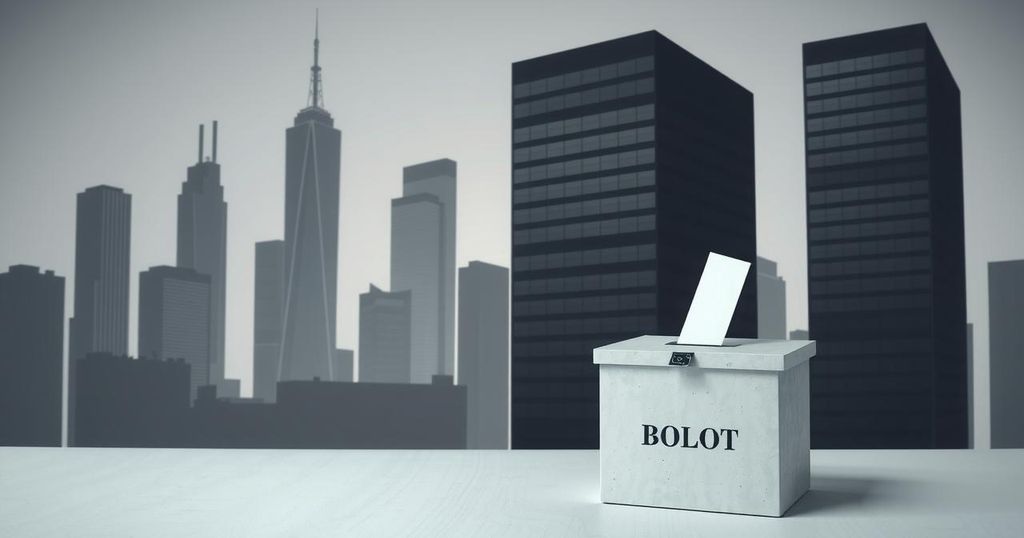Ecuador is set for a presidential run-off election between incumbent Daniel Noboa and left-wing challenger Luisa Gonzalez, both achieving nearly identical voter support in the first round. Gonzalez’s unexpected surge marks a significant political moment amid rising security concerns in Ecuador. The election is perceived as a referendum on Noboa’s crime policies and the country’s economic hardships, with implications for governance ahead.
A second-round run-off is anticipated in Ecuador’s presidential election, where incumbent President Daniel Noboa and leftist contender Luisa Gonzalez are locked in a tight race. Preliminary reports from the National Electoral Council indicated that Noboa secured 44.4% of the votes, closely followed by Gonzalez at 44.1%, as voting results from 80% of ballots were counted. With other candidates lagging far behind, a definitive vote is likely needed on April 13.
The unexpected strength of Gonzalez, a former protégée of ex-President Rafael Correa, caught many by surprise, driven by a significant increase in public backing. Celebrating with supporters in Quito, she described the election outcome as a “statistical tie,” claiming it represented a remarkable success for her campaign. Her performance exceeded pre-election predictions that favored Noboa, seeking to avoid a run-off by achieving over 50% of the votes.
Supporters of President Noboa celebrated despite the looming run-off, rallying in Quito and Guayaquil. Myriam Medrano, a 52-year-old secretary, expressed hope in Noboa’s leadership, stating, “We came to support the president, we want him to support us and change the country.” The election has been perceived as a referendum on Noboa’s stringent crime-fighting policies amidst escalating violence fueled by drug cartels.
Noboa’s measures against crime, which included declaring a state of emergency and military deployment, have been controversial. Human rights organizations have raised concerns regarding abuses resulting from these actions. On election day, Noboa increased security by placing armed soldiers at polling stations and closing borders with Colombia and Peru.
Furthermore, Noboa is currently involved in political disputes regarding his vice presidency as the Constitutional Court invalidated decrees enabling his campaign leave ahead of the initial election. This ruling complicates his efforts to appoint a provisional vice president and could hinder his campaign strategies for the upcoming run-off election.
In summary, Ecuador’s upcoming presidential run-off features a tightly contested race between incumbent President Daniel Noboa and challenger Luisa Gonzalez. The election has raised significant concerns about security and economic performance, while both candidates prepare for a pivotal second round to determine Ecuador’s leadership.
Ecuador is currently navigating a pressing presidential election influenced heavily by severe security concerns arising from a rampant crime wave linked to drug trafficking. The race reflects broader societal dissatisfaction with the existing administration’s approach to governance and crime. The current political climate showcases a stark divide between right and left-wing ideologies, with the election seen as a pivotal moment in shaping the future of the nation. Ecuador’s challenges, including economic instability and significant rises in violent crime, exacerbate the election’s stakes, as voters seek solutions to pressing issues. Candidates must address public safety and economic recovery to garner support from a weary electorate. Noboa’s aggressive approach to crisis management and Gonzalez’s rise as a formidable left-wing candidate offer voters contrasting visions for the future. The stakes are high as the nation prepares to re-evaluate its leadership in the context of these ongoing challenges.
Ecuador’s impending second-round presidential election highlights a significant rivalry between incumbent Daniel Noboa and left-wing challenger Luisa Gonzalez, reflecting broader societal issues, particularly around governance and security. The close results from the first round underscore the electorate’s demand for effective leadership amidst ongoing violence and economic strain. As both candidates prepare for the decisive vote on April 13, the outcome will shape Ecuador’s trajectory in addressing its most pressing challenges.
Original Source: www.aljazeera.com






